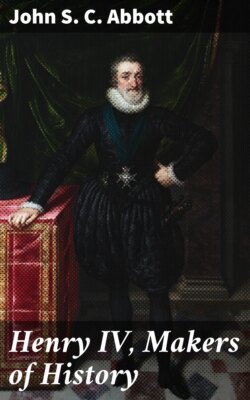Читать книгу Henry IV, Makers of History - John S. C. Abbott - Страница 8
На сайте Литреса книга снята с продажи.
ОглавлениеLiberty of worship.
Indignation and animosity.
At last both parties were weary of the horrid strife. The Catholics were struggling to extirpate what they deemed ruinous heresy from the kingdom. The Protestants were repelling the assault, and contending, not for general liberty of conscience, but that their doctrines were true, and therefore should be sustained. Terms of accommodation were proposed, and the Catholics made the great concession, as they regarded it, of allowing the Protestants to conduct public worship outside of the walls of towns. The Protestants accepted these terms, and sheathed the sword; but many of the more fanatic Catholics were greatly enraged at this toleration. The Guises, the most arrogant family of nobles the world has ever known, retired from Paris in indignation, declaring that they would not witness such a triumph of heresy. The decree which granted this poor boon was the famous edict of January, 1562, issued from St. Germain. But such a peace as this could only be a truce caused by exhaustion. Deep-seated animosity still rankled in the bosom of both parties; and, notwithstanding all the woes which desolating wars had engendered, the spirit of religious intolerance was eager again to grasp the weapons of deadly strife.
Religious toleration.
Belief of the Romanists.
Establishment of freedom of conscience.
During the sixteenth century the doctrine of religious toleration was recognized by no one. That great truth had not then even dawned upon the world. The noble toleration so earnestly advocated by Bayle and Locke a century later, was almost a new revelation to the human mind; but in the sixteenth century it would have been regarded as impious, and rebellion against God to have affirmed that error was not to be pursued and punished. The reformers did not advocate the view that a man had a right to believe what he pleased, and to disseminate that belief. They only declared that they were bound, at all hazards, to believe the truth; that the views which they cherished were true, and that therefore they should be protected in them. They appealed to the Bible, and challenged their adversaries to meet them there. Our fathers must not be condemned for not being in advance of the age in which they lived. That toleration which allows a man to adopt, without any civil disabilities, any mode of worship that does not disturb the peace of society, exists, as we believe, only in the United States. Even in England Dissenters are excluded from many privileges. Throughout the whole of Catholic Europe no religious toleration is recognized. The Emperor Napoleon, during his reign, established the most perfect freedom of conscience in every government his influence could control. His downfall re-established through Europe the dominion of intolerance.
The Reformation, in contending for the right of private judgment in contradiction to the claims of councils, maintained a principle which necessarily involved the freedom of conscience. This was not then perceived; but time developed the truth. The Reformation became, in reality, the mother of all religious liberty.
